Assessment of Director's Duties: Good Faith and Proper Purpose in Law
VerifiedAdded on 2022/12/23
|10
|3368
|57
Essay
AI Summary
This essay delves into the core principles of good faith and proper purpose as they pertain to the duties of company directors, as outlined in the Corporations Act 2001 (Cth). It explores the meaning of these terms, emphasizing the importance of honesty, sincerity, and the avoidance of improper motives in director actions. The essay analyzes the role of good faith and proper purpose as statutory mechanisms that facilitate corporate governance, aligning with the principles of accountability, transparency, and responsible management. It examines the fiduciary duty of directors, their obligation to act in the best interests of the company, and the implications of breaching these duties, referencing case law, including ASIC v Flugge & Geary [2016] VSC 779, to illustrate these concepts. The essay further discusses the impact of director's actions on the company and the potential liabilities that may arise from a failure to act in good faith or for a proper purpose. Ultimately, the essay highlights the importance of these principles in maintaining ethical standards and ensuring effective corporate governance.
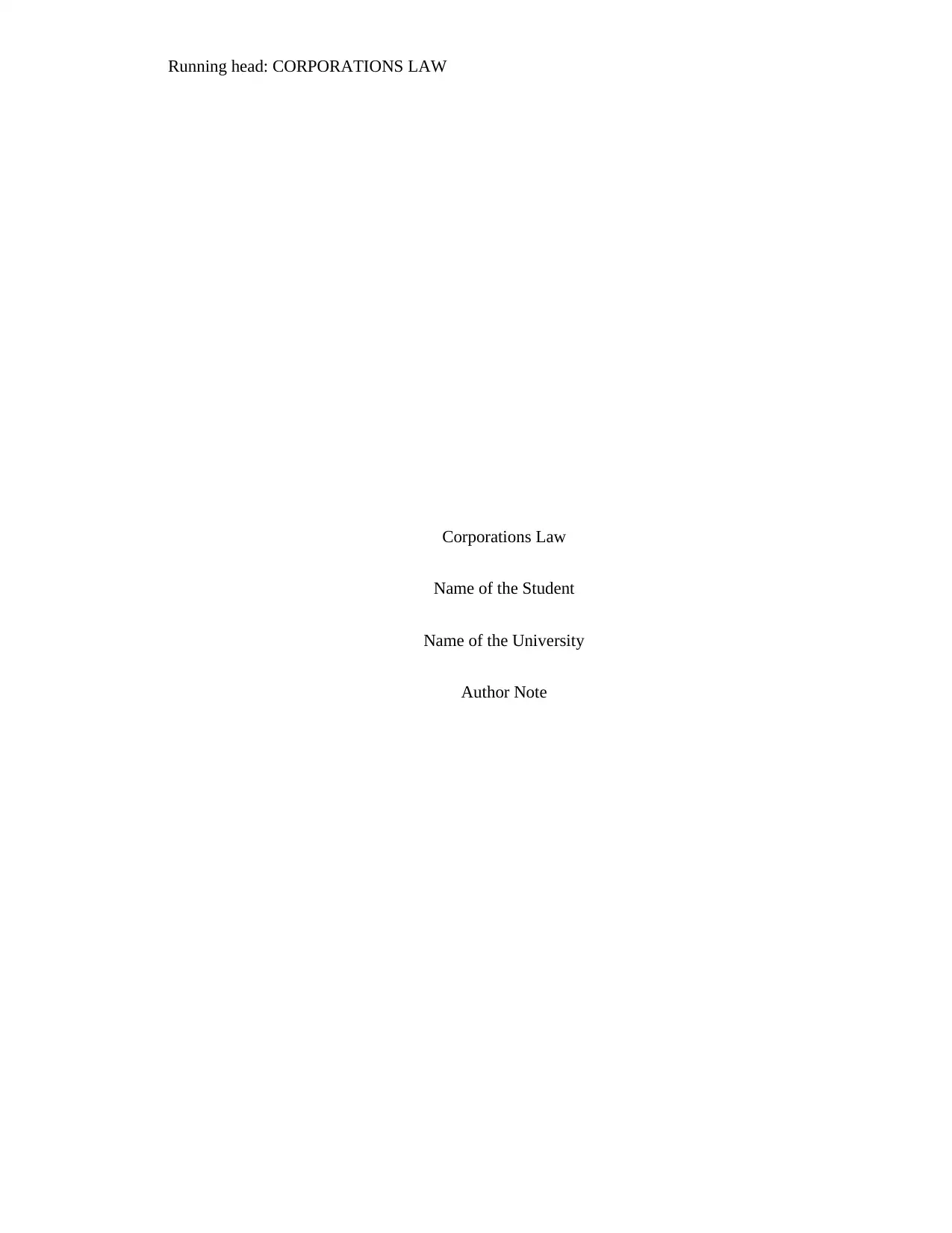
Running head: CORPORATIONS LAW
Corporations Law
Name of the Student
Name of the University
Author Note
Corporations Law
Name of the Student
Name of the University
Author Note
Paraphrase This Document
Need a fresh take? Get an instant paraphrase of this document with our AI Paraphraser
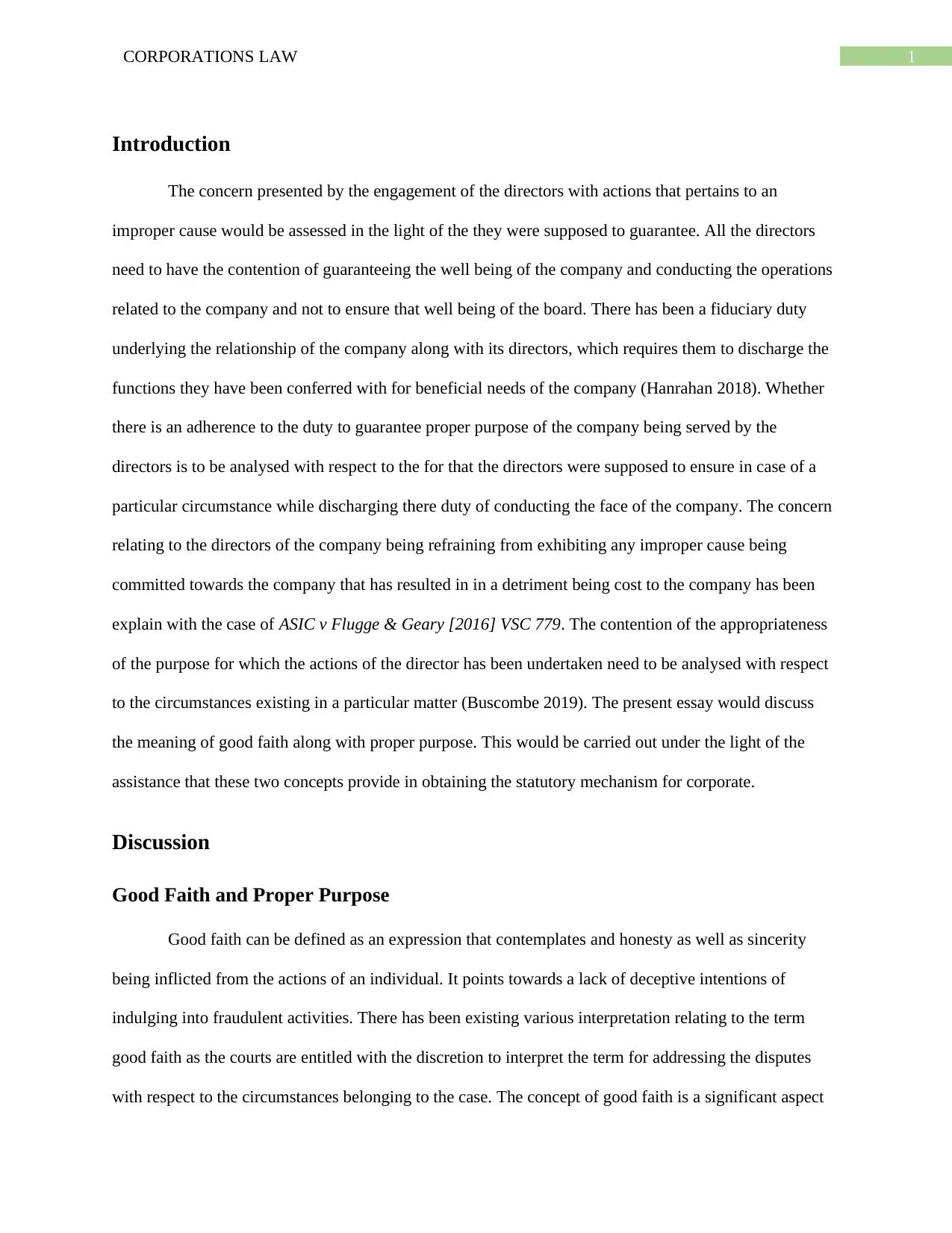
1CORPORATIONS LAW
Introduction
The concern presented by the engagement of the directors with actions that pertains to an
improper cause would be assessed in the light of the they were supposed to guarantee. All the directors
need to have the contention of guaranteeing the well being of the company and conducting the operations
related to the company and not to ensure that well being of the board. There has been a fiduciary duty
underlying the relationship of the company along with its directors, which requires them to discharge the
functions they have been conferred with for beneficial needs of the company (Hanrahan 2018). Whether
there is an adherence to the duty to guarantee proper purpose of the company being served by the
directors is to be analysed with respect to the for that the directors were supposed to ensure in case of a
particular circumstance while discharging there duty of conducting the face of the company. The concern
relating to the directors of the company being refraining from exhibiting any improper cause being
committed towards the company that has resulted in in a detriment being cost to the company has been
explain with the case of ASIC v Flugge & Geary [2016] VSC 779. The contention of the appropriateness
of the purpose for which the actions of the director has been undertaken need to be analysed with respect
to the circumstances existing in a particular matter (Buscombe 2019). The present essay would discuss
the meaning of good faith along with proper purpose. This would be carried out under the light of the
assistance that these two concepts provide in obtaining the statutory mechanism for corporate.
Discussion
Good Faith and Proper Purpose
Good faith can be defined as an expression that contemplates and honesty as well as sincerity
being inflicted from the actions of an individual. It points towards a lack of deceptive intentions of
indulging into fraudulent activities. There has been existing various interpretation relating to the term
good faith as the courts are entitled with the discretion to interpret the term for addressing the disputes
with respect to the circumstances belonging to the case. The concept of good faith is a significant aspect
Introduction
The concern presented by the engagement of the directors with actions that pertains to an
improper cause would be assessed in the light of the they were supposed to guarantee. All the directors
need to have the contention of guaranteeing the well being of the company and conducting the operations
related to the company and not to ensure that well being of the board. There has been a fiduciary duty
underlying the relationship of the company along with its directors, which requires them to discharge the
functions they have been conferred with for beneficial needs of the company (Hanrahan 2018). Whether
there is an adherence to the duty to guarantee proper purpose of the company being served by the
directors is to be analysed with respect to the for that the directors were supposed to ensure in case of a
particular circumstance while discharging there duty of conducting the face of the company. The concern
relating to the directors of the company being refraining from exhibiting any improper cause being
committed towards the company that has resulted in in a detriment being cost to the company has been
explain with the case of ASIC v Flugge & Geary [2016] VSC 779. The contention of the appropriateness
of the purpose for which the actions of the director has been undertaken need to be analysed with respect
to the circumstances existing in a particular matter (Buscombe 2019). The present essay would discuss
the meaning of good faith along with proper purpose. This would be carried out under the light of the
assistance that these two concepts provide in obtaining the statutory mechanism for corporate.
Discussion
Good Faith and Proper Purpose
Good faith can be defined as an expression that contemplates and honesty as well as sincerity
being inflicted from the actions of an individual. It points towards a lack of deceptive intentions of
indulging into fraudulent activities. There has been existing various interpretation relating to the term
good faith as the courts are entitled with the discretion to interpret the term for addressing the disputes
with respect to the circumstances belonging to the case. The concept of good faith is a significant aspect
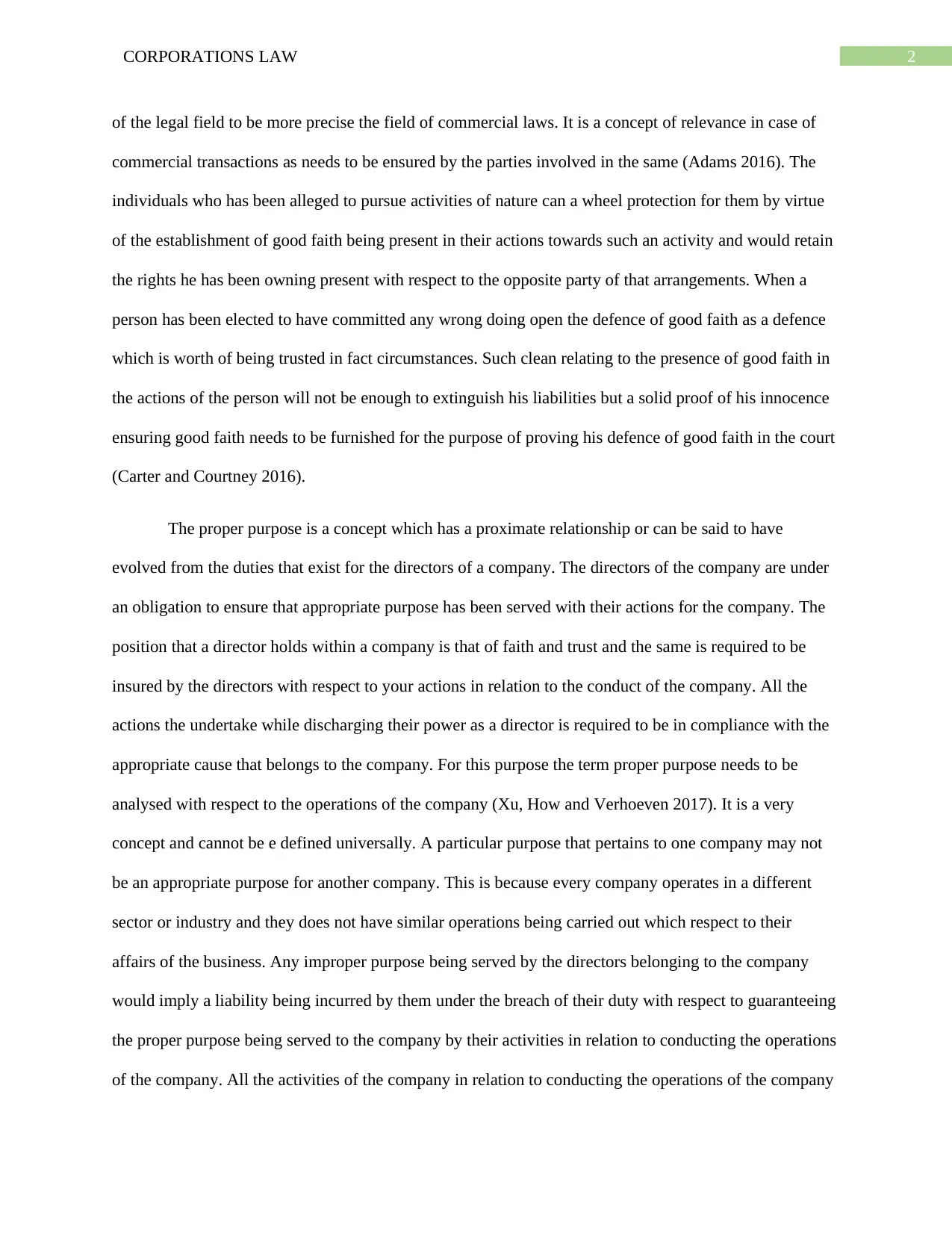
2CORPORATIONS LAW
of the legal field to be more precise the field of commercial laws. It is a concept of relevance in case of
commercial transactions as needs to be ensured by the parties involved in the same (Adams 2016). The
individuals who has been alleged to pursue activities of nature can a wheel protection for them by virtue
of the establishment of good faith being present in their actions towards such an activity and would retain
the rights he has been owning present with respect to the opposite party of that arrangements. When a
person has been elected to have committed any wrong doing open the defence of good faith as a defence
which is worth of being trusted in fact circumstances. Such clean relating to the presence of good faith in
the actions of the person will not be enough to extinguish his liabilities but a solid proof of his innocence
ensuring good faith needs to be furnished for the purpose of proving his defence of good faith in the court
(Carter and Courtney 2016).
The proper purpose is a concept which has a proximate relationship or can be said to have
evolved from the duties that exist for the directors of a company. The directors of the company are under
an obligation to ensure that appropriate purpose has been served with their actions for the company. The
position that a director holds within a company is that of faith and trust and the same is required to be
insured by the directors with respect to your actions in relation to the conduct of the company. All the
actions the undertake while discharging their power as a director is required to be in compliance with the
appropriate cause that belongs to the company. For this purpose the term proper purpose needs to be
analysed with respect to the operations of the company (Xu, How and Verhoeven 2017). It is a very
concept and cannot be e defined universally. A particular purpose that pertains to one company may not
be an appropriate purpose for another company. This is because every company operates in a different
sector or industry and they does not have similar operations being carried out which respect to their
affairs of the business. Any improper purpose being served by the directors belonging to the company
would imply a liability being incurred by them under the breach of their duty with respect to guaranteeing
the proper purpose being served to the company by their activities in relation to conducting the operations
of the company. All the activities of the company in relation to conducting the operations of the company
of the legal field to be more precise the field of commercial laws. It is a concept of relevance in case of
commercial transactions as needs to be ensured by the parties involved in the same (Adams 2016). The
individuals who has been alleged to pursue activities of nature can a wheel protection for them by virtue
of the establishment of good faith being present in their actions towards such an activity and would retain
the rights he has been owning present with respect to the opposite party of that arrangements. When a
person has been elected to have committed any wrong doing open the defence of good faith as a defence
which is worth of being trusted in fact circumstances. Such clean relating to the presence of good faith in
the actions of the person will not be enough to extinguish his liabilities but a solid proof of his innocence
ensuring good faith needs to be furnished for the purpose of proving his defence of good faith in the court
(Carter and Courtney 2016).
The proper purpose is a concept which has a proximate relationship or can be said to have
evolved from the duties that exist for the directors of a company. The directors of the company are under
an obligation to ensure that appropriate purpose has been served with their actions for the company. The
position that a director holds within a company is that of faith and trust and the same is required to be
insured by the directors with respect to your actions in relation to the conduct of the company. All the
actions the undertake while discharging their power as a director is required to be in compliance with the
appropriate cause that belongs to the company. For this purpose the term proper purpose needs to be
analysed with respect to the operations of the company (Xu, How and Verhoeven 2017). It is a very
concept and cannot be e defined universally. A particular purpose that pertains to one company may not
be an appropriate purpose for another company. This is because every company operates in a different
sector or industry and they does not have similar operations being carried out which respect to their
affairs of the business. Any improper purpose being served by the directors belonging to the company
would imply a liability being incurred by them under the breach of their duty with respect to guaranteeing
the proper purpose being served to the company by their activities in relation to conducting the operations
of the company. All the activities of the company in relation to conducting the operations of the company
⊘ This is a preview!⊘
Do you want full access?
Subscribe today to unlock all pages.

Trusted by 1+ million students worldwide
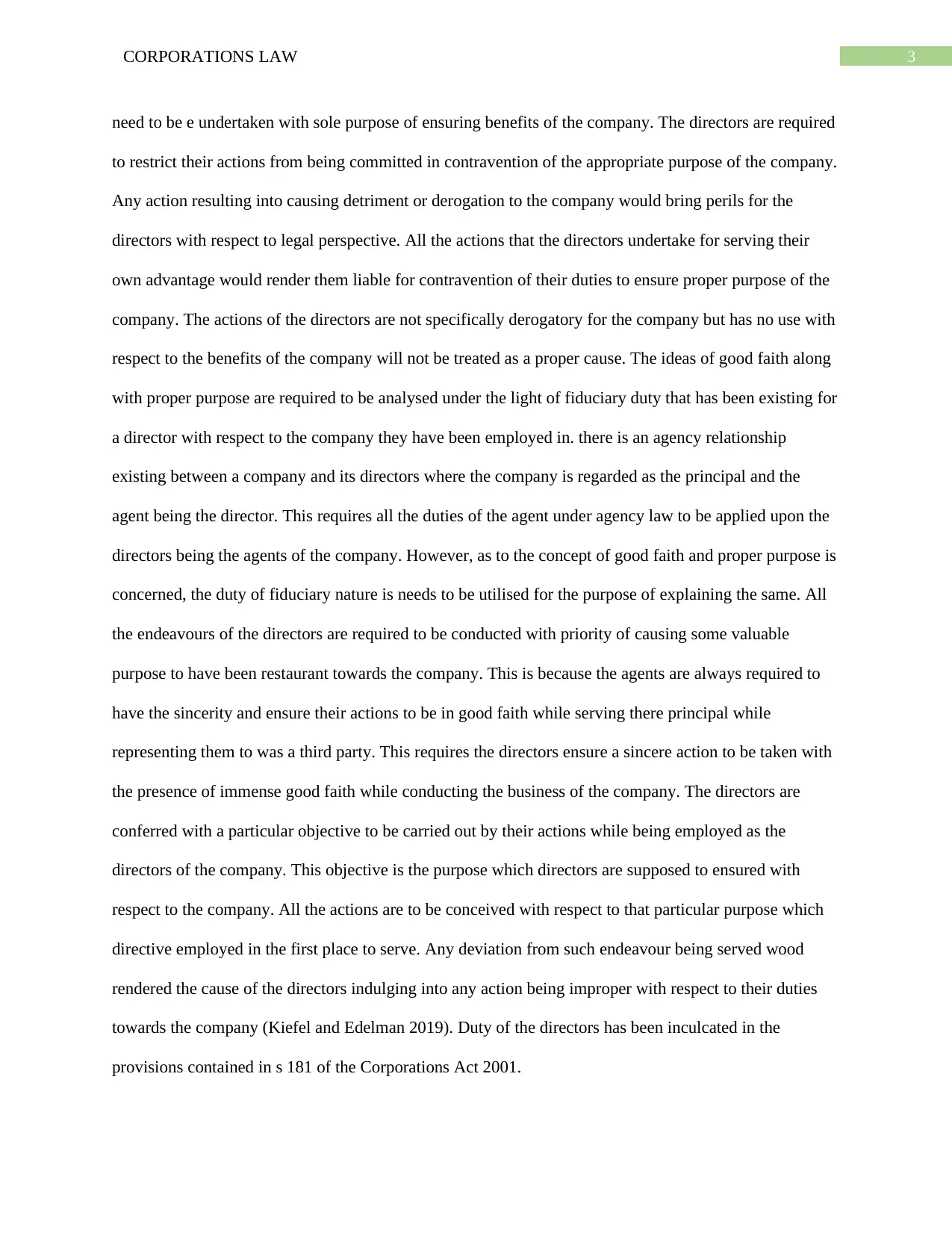
3CORPORATIONS LAW
need to be e undertaken with sole purpose of ensuring benefits of the company. The directors are required
to restrict their actions from being committed in contravention of the appropriate purpose of the company.
Any action resulting into causing detriment or derogation to the company would bring perils for the
directors with respect to legal perspective. All the actions that the directors undertake for serving their
own advantage would render them liable for contravention of their duties to ensure proper purpose of the
company. The actions of the directors are not specifically derogatory for the company but has no use with
respect to the benefits of the company will not be treated as a proper cause. The ideas of good faith along
with proper purpose are required to be analysed under the light of fiduciary duty that has been existing for
a director with respect to the company they have been employed in. there is an agency relationship
existing between a company and its directors where the company is regarded as the principal and the
agent being the director. This requires all the duties of the agent under agency law to be applied upon the
directors being the agents of the company. However, as to the concept of good faith and proper purpose is
concerned, the duty of fiduciary nature is needs to be utilised for the purpose of explaining the same. All
the endeavours of the directors are required to be conducted with priority of causing some valuable
purpose to have been restaurant towards the company. This is because the agents are always required to
have the sincerity and ensure their actions to be in good faith while serving there principal while
representing them to was a third party. This requires the directors ensure a sincere action to be taken with
the presence of immense good faith while conducting the business of the company. The directors are
conferred with a particular objective to be carried out by their actions while being employed as the
directors of the company. This objective is the purpose which directors are supposed to ensured with
respect to the company. All the actions are to be conceived with respect to that particular purpose which
directive employed in the first place to serve. Any deviation from such endeavour being served wood
rendered the cause of the directors indulging into any action being improper with respect to their duties
towards the company (Kiefel and Edelman 2019). Duty of the directors has been inculcated in the
provisions contained in s 181 of the Corporations Act 2001.
need to be e undertaken with sole purpose of ensuring benefits of the company. The directors are required
to restrict their actions from being committed in contravention of the appropriate purpose of the company.
Any action resulting into causing detriment or derogation to the company would bring perils for the
directors with respect to legal perspective. All the actions that the directors undertake for serving their
own advantage would render them liable for contravention of their duties to ensure proper purpose of the
company. The actions of the directors are not specifically derogatory for the company but has no use with
respect to the benefits of the company will not be treated as a proper cause. The ideas of good faith along
with proper purpose are required to be analysed under the light of fiduciary duty that has been existing for
a director with respect to the company they have been employed in. there is an agency relationship
existing between a company and its directors where the company is regarded as the principal and the
agent being the director. This requires all the duties of the agent under agency law to be applied upon the
directors being the agents of the company. However, as to the concept of good faith and proper purpose is
concerned, the duty of fiduciary nature is needs to be utilised for the purpose of explaining the same. All
the endeavours of the directors are required to be conducted with priority of causing some valuable
purpose to have been restaurant towards the company. This is because the agents are always required to
have the sincerity and ensure their actions to be in good faith while serving there principal while
representing them to was a third party. This requires the directors ensure a sincere action to be taken with
the presence of immense good faith while conducting the business of the company. The directors are
conferred with a particular objective to be carried out by their actions while being employed as the
directors of the company. This objective is the purpose which directors are supposed to ensured with
respect to the company. All the actions are to be conceived with respect to that particular purpose which
directive employed in the first place to serve. Any deviation from such endeavour being served wood
rendered the cause of the directors indulging into any action being improper with respect to their duties
towards the company (Kiefel and Edelman 2019). Duty of the directors has been inculcated in the
provisions contained in s 181 of the Corporations Act 2001.
Paraphrase This Document
Need a fresh take? Get an instant paraphrase of this document with our AI Paraphraser
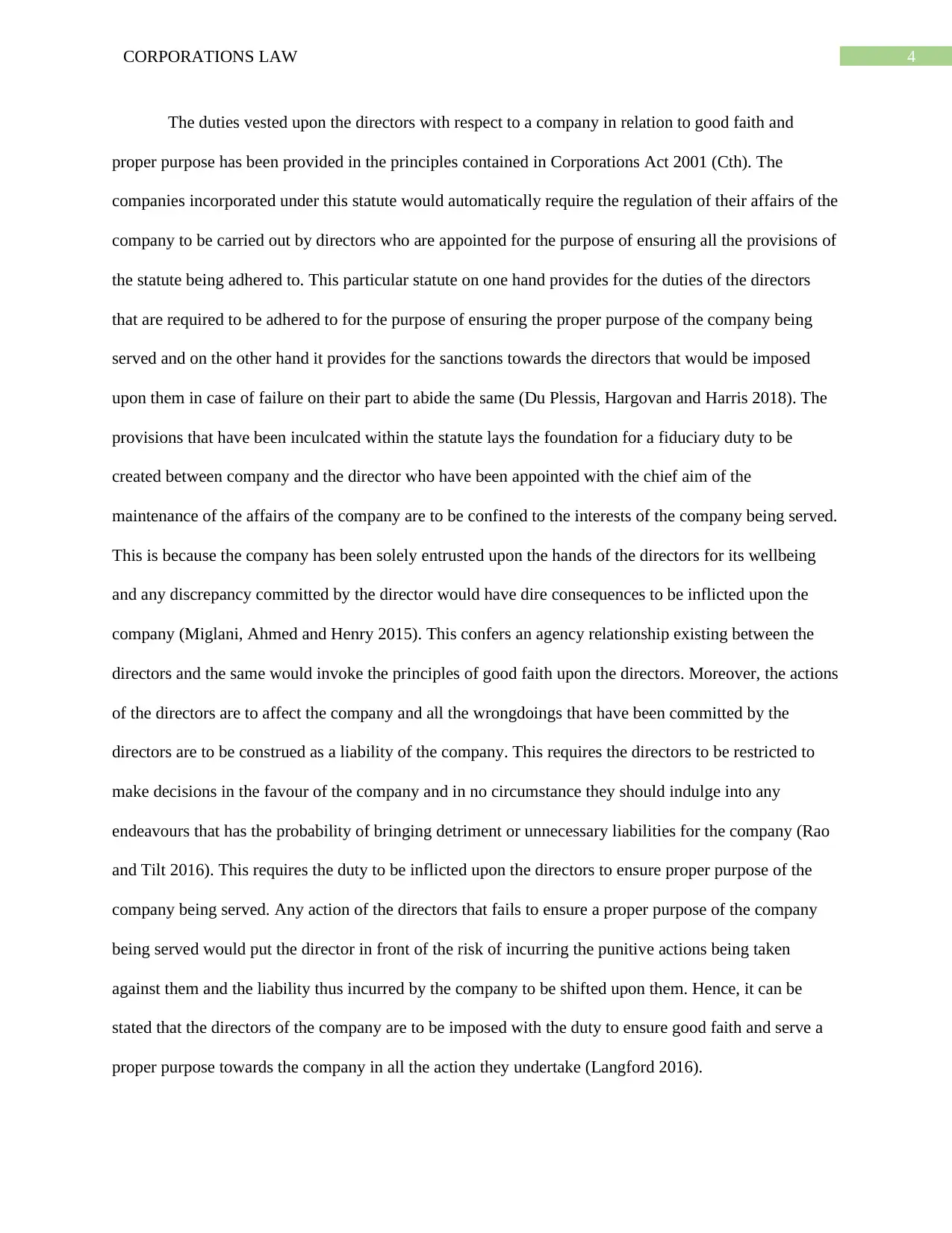
4CORPORATIONS LAW
The duties vested upon the directors with respect to a company in relation to good faith and
proper purpose has been provided in the principles contained in Corporations Act 2001 (Cth). The
companies incorporated under this statute would automatically require the regulation of their affairs of the
company to be carried out by directors who are appointed for the purpose of ensuring all the provisions of
the statute being adhered to. This particular statute on one hand provides for the duties of the directors
that are required to be adhered to for the purpose of ensuring the proper purpose of the company being
served and on the other hand it provides for the sanctions towards the directors that would be imposed
upon them in case of failure on their part to abide the same (Du Plessis, Hargovan and Harris 2018). The
provisions that have been inculcated within the statute lays the foundation for a fiduciary duty to be
created between company and the director who have been appointed with the chief aim of the
maintenance of the affairs of the company are to be confined to the interests of the company being served.
This is because the company has been solely entrusted upon the hands of the directors for its wellbeing
and any discrepancy committed by the director would have dire consequences to be inflicted upon the
company (Miglani, Ahmed and Henry 2015). This confers an agency relationship existing between the
directors and the same would invoke the principles of good faith upon the directors. Moreover, the actions
of the directors are to affect the company and all the wrongdoings that have been committed by the
directors are to be construed as a liability of the company. This requires the directors to be restricted to
make decisions in the favour of the company and in no circumstance they should indulge into any
endeavours that has the probability of bringing detriment or unnecessary liabilities for the company (Rao
and Tilt 2016). This requires the duty to be inflicted upon the directors to ensure proper purpose of the
company being served. Any action of the directors that fails to ensure a proper purpose of the company
being served would put the director in front of the risk of incurring the punitive actions being taken
against them and the liability thus incurred by the company to be shifted upon them. Hence, it can be
stated that the directors of the company are to be imposed with the duty to ensure good faith and serve a
proper purpose towards the company in all the action they undertake (Langford 2016).
The duties vested upon the directors with respect to a company in relation to good faith and
proper purpose has been provided in the principles contained in Corporations Act 2001 (Cth). The
companies incorporated under this statute would automatically require the regulation of their affairs of the
company to be carried out by directors who are appointed for the purpose of ensuring all the provisions of
the statute being adhered to. This particular statute on one hand provides for the duties of the directors
that are required to be adhered to for the purpose of ensuring the proper purpose of the company being
served and on the other hand it provides for the sanctions towards the directors that would be imposed
upon them in case of failure on their part to abide the same (Du Plessis, Hargovan and Harris 2018). The
provisions that have been inculcated within the statute lays the foundation for a fiduciary duty to be
created between company and the director who have been appointed with the chief aim of the
maintenance of the affairs of the company are to be confined to the interests of the company being served.
This is because the company has been solely entrusted upon the hands of the directors for its wellbeing
and any discrepancy committed by the director would have dire consequences to be inflicted upon the
company (Miglani, Ahmed and Henry 2015). This confers an agency relationship existing between the
directors and the same would invoke the principles of good faith upon the directors. Moreover, the actions
of the directors are to affect the company and all the wrongdoings that have been committed by the
directors are to be construed as a liability of the company. This requires the directors to be restricted to
make decisions in the favour of the company and in no circumstance they should indulge into any
endeavours that has the probability of bringing detriment or unnecessary liabilities for the company (Rao
and Tilt 2016). This requires the duty to be inflicted upon the directors to ensure proper purpose of the
company being served. Any action of the directors that fails to ensure a proper purpose of the company
being served would put the director in front of the risk of incurring the punitive actions being taken
against them and the liability thus incurred by the company to be shifted upon them. Hence, it can be
stated that the directors of the company are to be imposed with the duty to ensure good faith and serve a
proper purpose towards the company in all the action they undertake (Langford 2016).
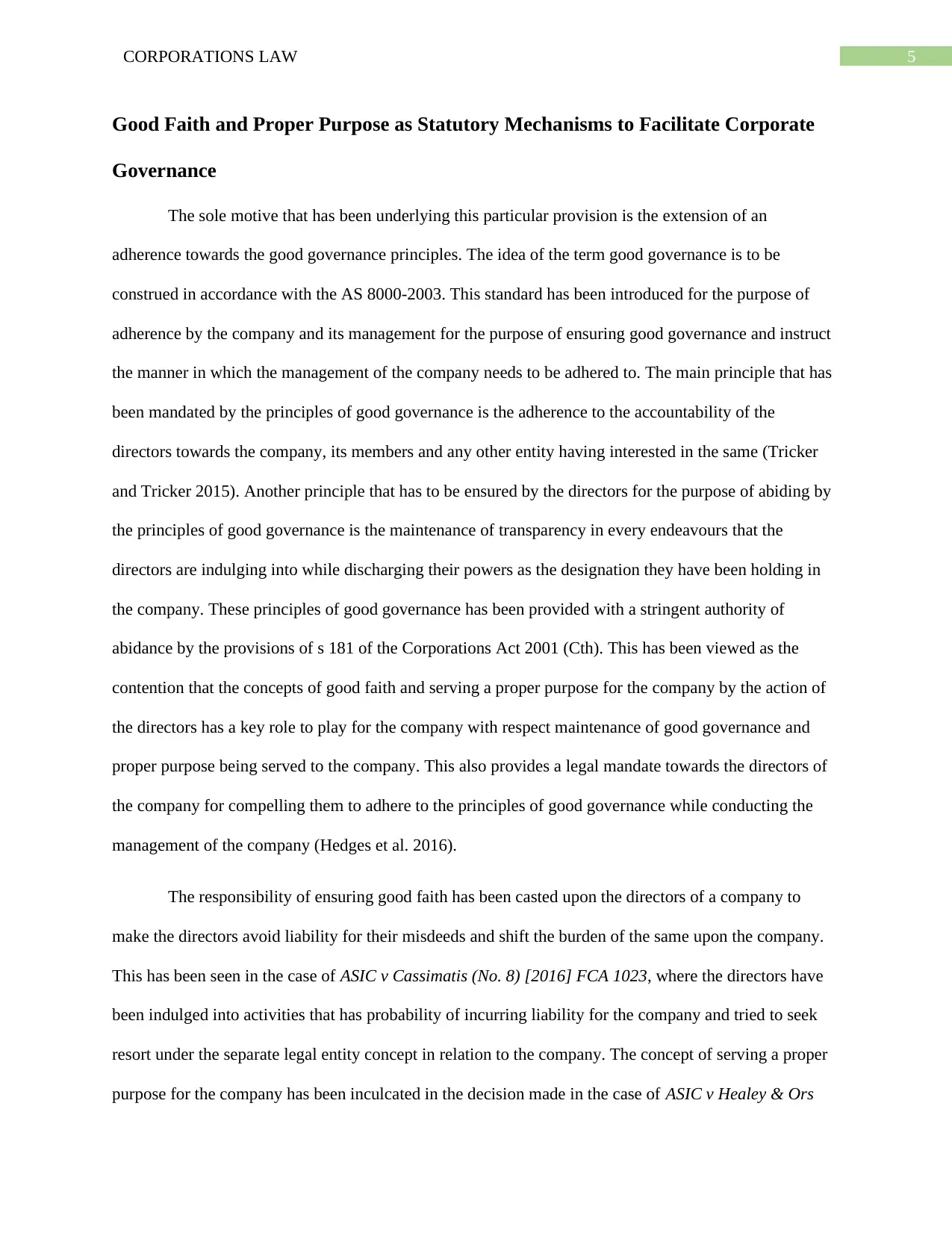
5CORPORATIONS LAW
Good Faith and Proper Purpose as Statutory Mechanisms to Facilitate Corporate
Governance
The sole motive that has been underlying this particular provision is the extension of an
adherence towards the good governance principles. The idea of the term good governance is to be
construed in accordance with the AS 8000-2003. This standard has been introduced for the purpose of
adherence by the company and its management for the purpose of ensuring good governance and instruct
the manner in which the management of the company needs to be adhered to. The main principle that has
been mandated by the principles of good governance is the adherence to the accountability of the
directors towards the company, its members and any other entity having interested in the same (Tricker
and Tricker 2015). Another principle that has to be ensured by the directors for the purpose of abiding by
the principles of good governance is the maintenance of transparency in every endeavours that the
directors are indulging into while discharging their powers as the designation they have been holding in
the company. These principles of good governance has been provided with a stringent authority of
abidance by the provisions of s 181 of the Corporations Act 2001 (Cth). This has been viewed as the
contention that the concepts of good faith and serving a proper purpose for the company by the action of
the directors has a key role to play for the company with respect maintenance of good governance and
proper purpose being served to the company. This also provides a legal mandate towards the directors of
the company for compelling them to adhere to the principles of good governance while conducting the
management of the company (Hedges et al. 2016).
The responsibility of ensuring good faith has been casted upon the directors of a company to
make the directors avoid liability for their misdeeds and shift the burden of the same upon the company.
This has been seen in the case of ASIC v Cassimatis (No. 8) [2016] FCA 1023, where the directors have
been indulged into activities that has probability of incurring liability for the company and tried to seek
resort under the separate legal entity concept in relation to the company. The concept of serving a proper
purpose for the company has been inculcated in the decision made in the case of ASIC v Healey & Ors
Good Faith and Proper Purpose as Statutory Mechanisms to Facilitate Corporate
Governance
The sole motive that has been underlying this particular provision is the extension of an
adherence towards the good governance principles. The idea of the term good governance is to be
construed in accordance with the AS 8000-2003. This standard has been introduced for the purpose of
adherence by the company and its management for the purpose of ensuring good governance and instruct
the manner in which the management of the company needs to be adhered to. The main principle that has
been mandated by the principles of good governance is the adherence to the accountability of the
directors towards the company, its members and any other entity having interested in the same (Tricker
and Tricker 2015). Another principle that has to be ensured by the directors for the purpose of abiding by
the principles of good governance is the maintenance of transparency in every endeavours that the
directors are indulging into while discharging their powers as the designation they have been holding in
the company. These principles of good governance has been provided with a stringent authority of
abidance by the provisions of s 181 of the Corporations Act 2001 (Cth). This has been viewed as the
contention that the concepts of good faith and serving a proper purpose for the company by the action of
the directors has a key role to play for the company with respect maintenance of good governance and
proper purpose being served to the company. This also provides a legal mandate towards the directors of
the company for compelling them to adhere to the principles of good governance while conducting the
management of the company (Hedges et al. 2016).
The responsibility of ensuring good faith has been casted upon the directors of a company to
make the directors avoid liability for their misdeeds and shift the burden of the same upon the company.
This has been seen in the case of ASIC v Cassimatis (No. 8) [2016] FCA 1023, where the directors have
been indulged into activities that has probability of incurring liability for the company and tried to seek
resort under the separate legal entity concept in relation to the company. The concept of serving a proper
purpose for the company has been inculcated in the decision made in the case of ASIC v Healey & Ors
⊘ This is a preview!⊘
Do you want full access?
Subscribe today to unlock all pages.

Trusted by 1+ million students worldwide
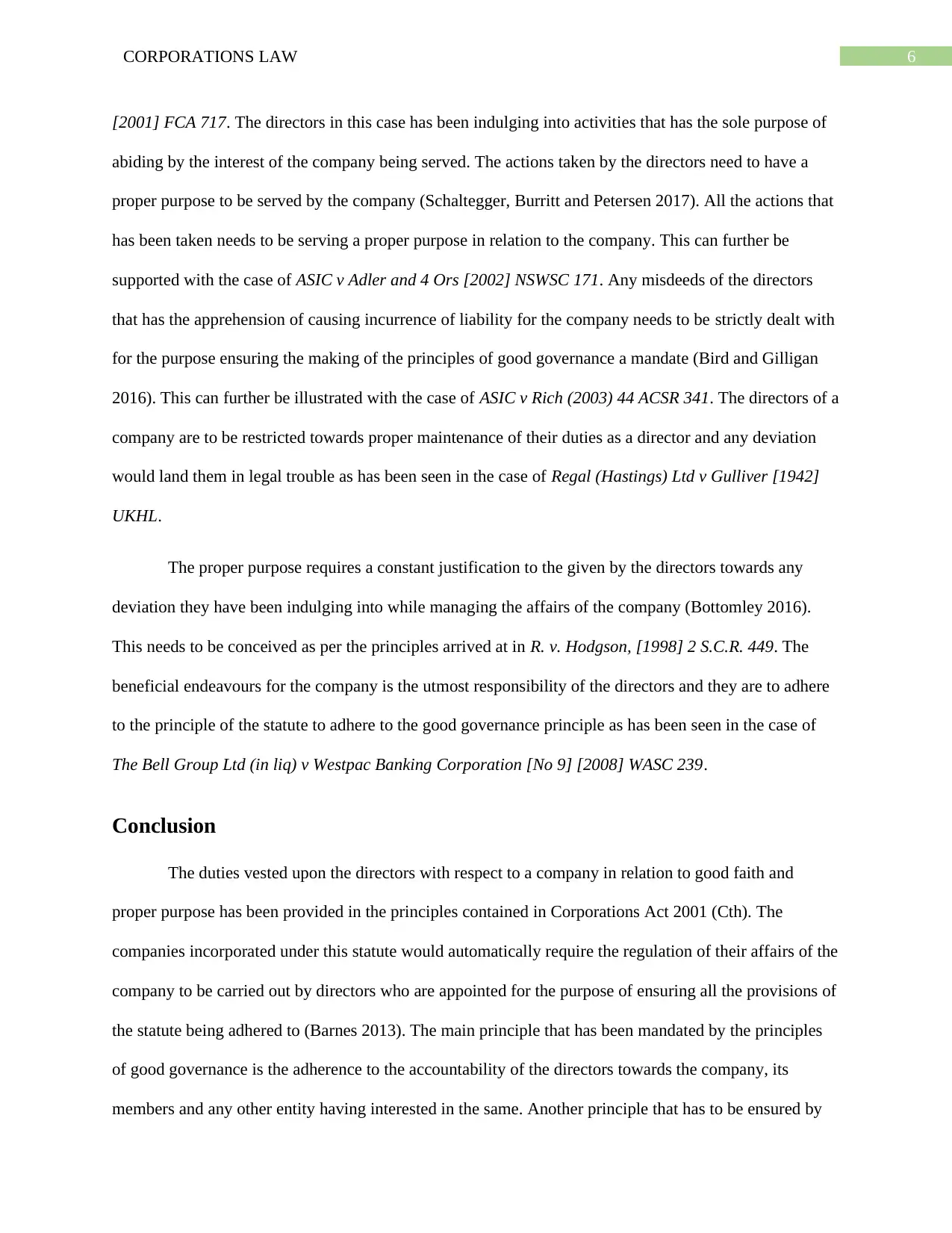
6CORPORATIONS LAW
[2001] FCA 717. The directors in this case has been indulging into activities that has the sole purpose of
abiding by the interest of the company being served. The actions taken by the directors need to have a
proper purpose to be served by the company (Schaltegger, Burritt and Petersen 2017). All the actions that
has been taken needs to be serving a proper purpose in relation to the company. This can further be
supported with the case of ASIC v Adler and 4 Ors [2002] NSWSC 171. Any misdeeds of the directors
that has the apprehension of causing incurrence of liability for the company needs to be strictly dealt with
for the purpose ensuring the making of the principles of good governance a mandate (Bird and Gilligan
2016). This can further be illustrated with the case of ASIC v Rich (2003) 44 ACSR 341. The directors of a
company are to be restricted towards proper maintenance of their duties as a director and any deviation
would land them in legal trouble as has been seen in the case of Regal (Hastings) Ltd v Gulliver [1942]
UKHL.
The proper purpose requires a constant justification to the given by the directors towards any
deviation they have been indulging into while managing the affairs of the company (Bottomley 2016).
This needs to be conceived as per the principles arrived at in R. v. Hodgson, [1998] 2 S.C.R. 449. The
beneficial endeavours for the company is the utmost responsibility of the directors and they are to adhere
to the principle of the statute to adhere to the good governance principle as has been seen in the case of
The Bell Group Ltd (in liq) v Westpac Banking Corporation [No 9] [2008] WASC 239.
Conclusion
The duties vested upon the directors with respect to a company in relation to good faith and
proper purpose has been provided in the principles contained in Corporations Act 2001 (Cth). The
companies incorporated under this statute would automatically require the regulation of their affairs of the
company to be carried out by directors who are appointed for the purpose of ensuring all the provisions of
the statute being adhered to (Barnes 2013). The main principle that has been mandated by the principles
of good governance is the adherence to the accountability of the directors towards the company, its
members and any other entity having interested in the same. Another principle that has to be ensured by
[2001] FCA 717. The directors in this case has been indulging into activities that has the sole purpose of
abiding by the interest of the company being served. The actions taken by the directors need to have a
proper purpose to be served by the company (Schaltegger, Burritt and Petersen 2017). All the actions that
has been taken needs to be serving a proper purpose in relation to the company. This can further be
supported with the case of ASIC v Adler and 4 Ors [2002] NSWSC 171. Any misdeeds of the directors
that has the apprehension of causing incurrence of liability for the company needs to be strictly dealt with
for the purpose ensuring the making of the principles of good governance a mandate (Bird and Gilligan
2016). This can further be illustrated with the case of ASIC v Rich (2003) 44 ACSR 341. The directors of a
company are to be restricted towards proper maintenance of their duties as a director and any deviation
would land them in legal trouble as has been seen in the case of Regal (Hastings) Ltd v Gulliver [1942]
UKHL.
The proper purpose requires a constant justification to the given by the directors towards any
deviation they have been indulging into while managing the affairs of the company (Bottomley 2016).
This needs to be conceived as per the principles arrived at in R. v. Hodgson, [1998] 2 S.C.R. 449. The
beneficial endeavours for the company is the utmost responsibility of the directors and they are to adhere
to the principle of the statute to adhere to the good governance principle as has been seen in the case of
The Bell Group Ltd (in liq) v Westpac Banking Corporation [No 9] [2008] WASC 239.
Conclusion
The duties vested upon the directors with respect to a company in relation to good faith and
proper purpose has been provided in the principles contained in Corporations Act 2001 (Cth). The
companies incorporated under this statute would automatically require the regulation of their affairs of the
company to be carried out by directors who are appointed for the purpose of ensuring all the provisions of
the statute being adhered to (Barnes 2013). The main principle that has been mandated by the principles
of good governance is the adherence to the accountability of the directors towards the company, its
members and any other entity having interested in the same. Another principle that has to be ensured by
Paraphrase This Document
Need a fresh take? Get an instant paraphrase of this document with our AI Paraphraser
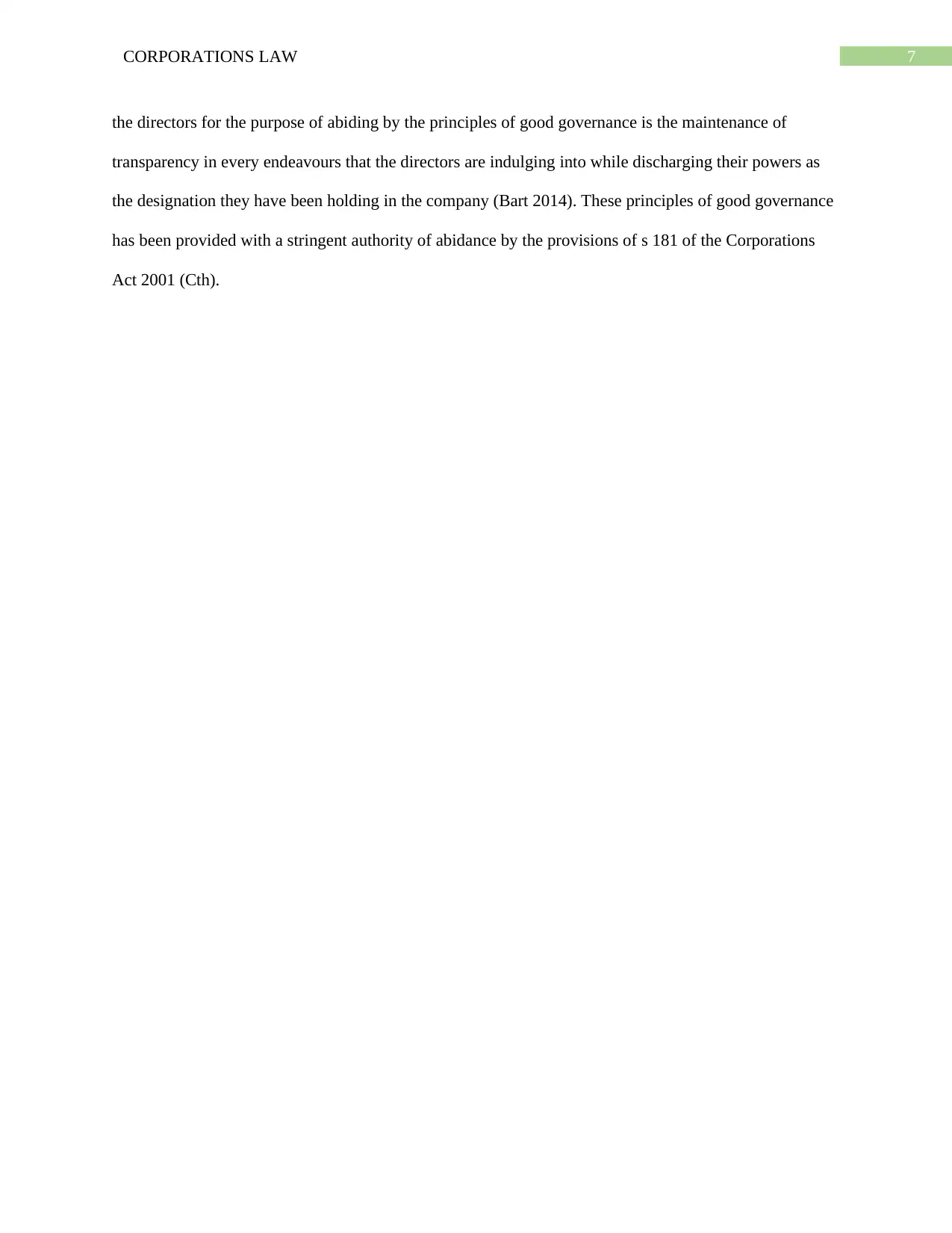
7CORPORATIONS LAW
the directors for the purpose of abiding by the principles of good governance is the maintenance of
transparency in every endeavours that the directors are indulging into while discharging their powers as
the designation they have been holding in the company (Bart 2014). These principles of good governance
has been provided with a stringent authority of abidance by the provisions of s 181 of the Corporations
Act 2001 (Cth).
the directors for the purpose of abiding by the principles of good governance is the maintenance of
transparency in every endeavours that the directors are indulging into while discharging their powers as
the designation they have been holding in the company (Bart 2014). These principles of good governance
has been provided with a stringent authority of abidance by the provisions of s 181 of the Corporations
Act 2001 (Cth).
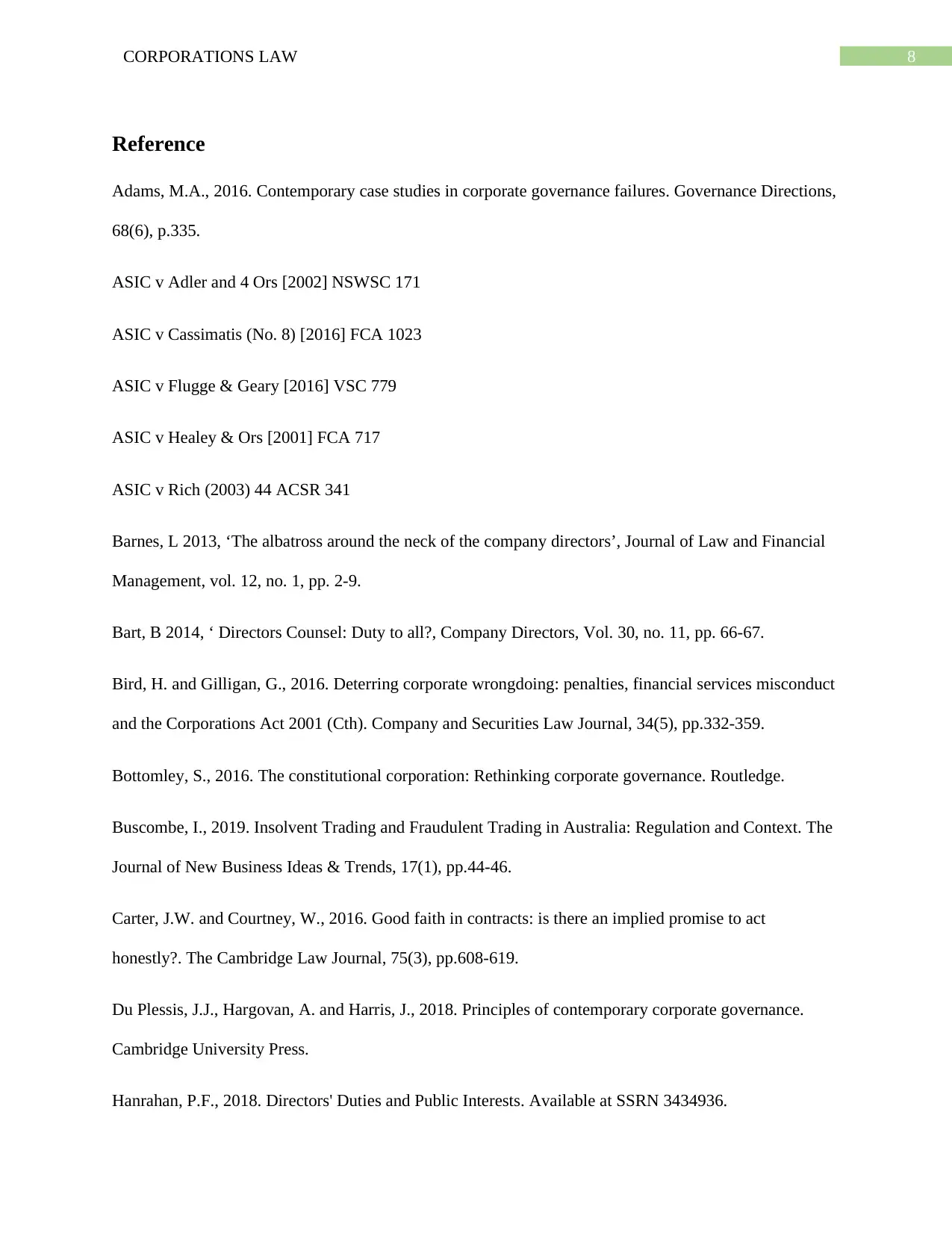
8CORPORATIONS LAW
Reference
Adams, M.A., 2016. Contemporary case studies in corporate governance failures. Governance Directions,
68(6), p.335.
ASIC v Adler and 4 Ors [2002] NSWSC 171
ASIC v Cassimatis (No. 8) [2016] FCA 1023
ASIC v Flugge & Geary [2016] VSC 779
ASIC v Healey & Ors [2001] FCA 717
ASIC v Rich (2003) 44 ACSR 341
Barnes, L 2013, ‘The albatross around the neck of the company directors’, Journal of Law and Financial
Management, vol. 12, no. 1, pp. 2-9.
Bart, B 2014, ‘ Directors Counsel: Duty to all?, Company Directors, Vol. 30, no. 11, pp. 66-67.
Bird, H. and Gilligan, G., 2016. Deterring corporate wrongdoing: penalties, financial services misconduct
and the Corporations Act 2001 (Cth). Company and Securities Law Journal, 34(5), pp.332-359.
Bottomley, S., 2016. The constitutional corporation: Rethinking corporate governance. Routledge.
Buscombe, I., 2019. Insolvent Trading and Fraudulent Trading in Australia: Regulation and Context. The
Journal of New Business Ideas & Trends, 17(1), pp.44-46.
Carter, J.W. and Courtney, W., 2016. Good faith in contracts: is there an implied promise to act
honestly?. The Cambridge Law Journal, 75(3), pp.608-619.
Du Plessis, J.J., Hargovan, A. and Harris, J., 2018. Principles of contemporary corporate governance.
Cambridge University Press.
Hanrahan, P.F., 2018. Directors' Duties and Public Interests. Available at SSRN 3434936.
Reference
Adams, M.A., 2016. Contemporary case studies in corporate governance failures. Governance Directions,
68(6), p.335.
ASIC v Adler and 4 Ors [2002] NSWSC 171
ASIC v Cassimatis (No. 8) [2016] FCA 1023
ASIC v Flugge & Geary [2016] VSC 779
ASIC v Healey & Ors [2001] FCA 717
ASIC v Rich (2003) 44 ACSR 341
Barnes, L 2013, ‘The albatross around the neck of the company directors’, Journal of Law and Financial
Management, vol. 12, no. 1, pp. 2-9.
Bart, B 2014, ‘ Directors Counsel: Duty to all?, Company Directors, Vol. 30, no. 11, pp. 66-67.
Bird, H. and Gilligan, G., 2016. Deterring corporate wrongdoing: penalties, financial services misconduct
and the Corporations Act 2001 (Cth). Company and Securities Law Journal, 34(5), pp.332-359.
Bottomley, S., 2016. The constitutional corporation: Rethinking corporate governance. Routledge.
Buscombe, I., 2019. Insolvent Trading and Fraudulent Trading in Australia: Regulation and Context. The
Journal of New Business Ideas & Trends, 17(1), pp.44-46.
Carter, J.W. and Courtney, W., 2016. Good faith in contracts: is there an implied promise to act
honestly?. The Cambridge Law Journal, 75(3), pp.608-619.
Du Plessis, J.J., Hargovan, A. and Harris, J., 2018. Principles of contemporary corporate governance.
Cambridge University Press.
Hanrahan, P.F., 2018. Directors' Duties and Public Interests. Available at SSRN 3434936.
⊘ This is a preview!⊘
Do you want full access?
Subscribe today to unlock all pages.

Trusted by 1+ million students worldwide
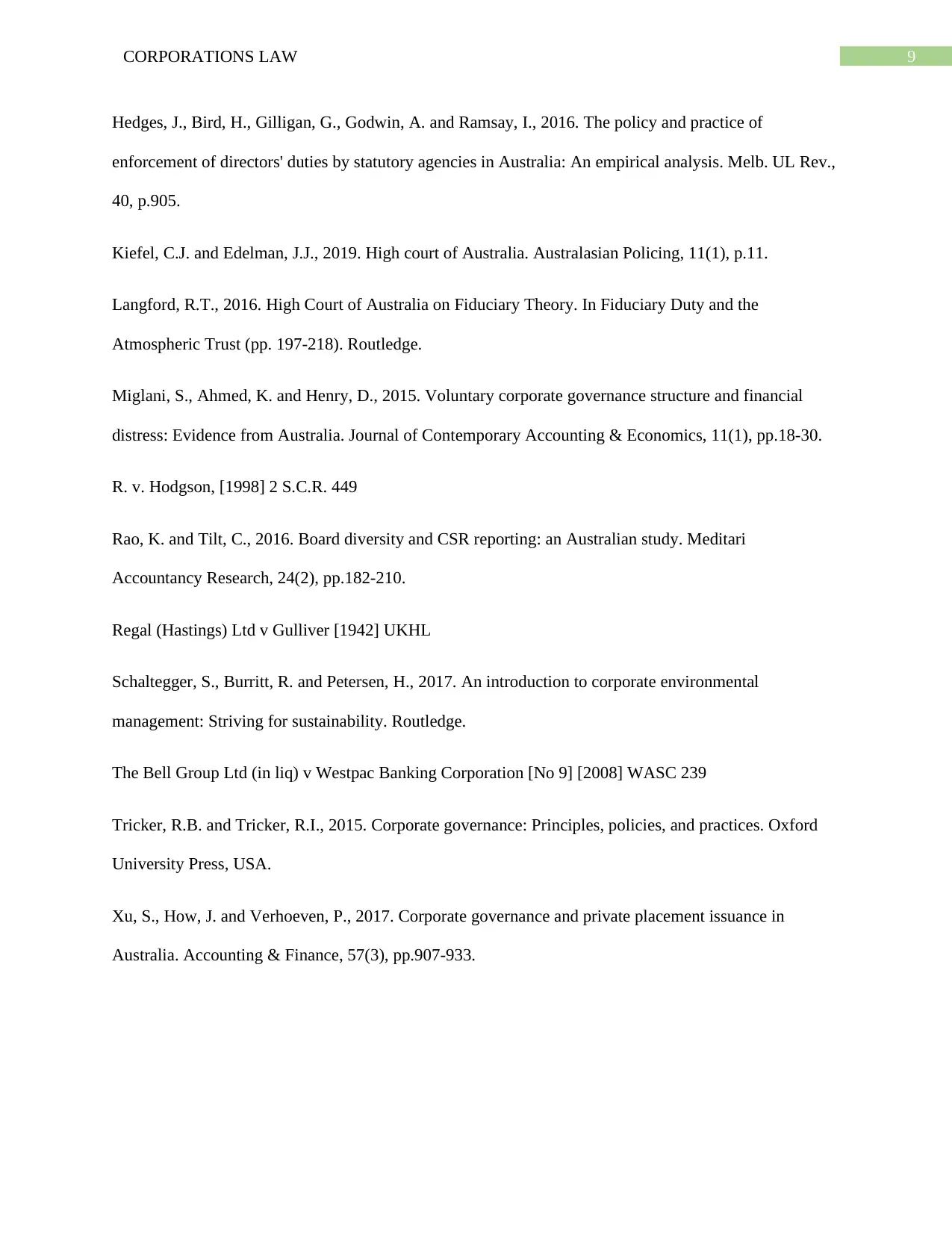
9CORPORATIONS LAW
Hedges, J., Bird, H., Gilligan, G., Godwin, A. and Ramsay, I., 2016. The policy and practice of
enforcement of directors' duties by statutory agencies in Australia: An empirical analysis. Melb. UL Rev.,
40, p.905.
Kiefel, C.J. and Edelman, J.J., 2019. High court of Australia. Australasian Policing, 11(1), p.11.
Langford, R.T., 2016. High Court of Australia on Fiduciary Theory. In Fiduciary Duty and the
Atmospheric Trust (pp. 197-218). Routledge.
Miglani, S., Ahmed, K. and Henry, D., 2015. Voluntary corporate governance structure and financial
distress: Evidence from Australia. Journal of Contemporary Accounting & Economics, 11(1), pp.18-30.
R. v. Hodgson, [1998] 2 S.C.R. 449
Rao, K. and Tilt, C., 2016. Board diversity and CSR reporting: an Australian study. Meditari
Accountancy Research, 24(2), pp.182-210.
Regal (Hastings) Ltd v Gulliver [1942] UKHL
Schaltegger, S., Burritt, R. and Petersen, H., 2017. An introduction to corporate environmental
management: Striving for sustainability. Routledge.
The Bell Group Ltd (in liq) v Westpac Banking Corporation [No 9] [2008] WASC 239
Tricker, R.B. and Tricker, R.I., 2015. Corporate governance: Principles, policies, and practices. Oxford
University Press, USA.
Xu, S., How, J. and Verhoeven, P., 2017. Corporate governance and private placement issuance in
Australia. Accounting & Finance, 57(3), pp.907-933.
Hedges, J., Bird, H., Gilligan, G., Godwin, A. and Ramsay, I., 2016. The policy and practice of
enforcement of directors' duties by statutory agencies in Australia: An empirical analysis. Melb. UL Rev.,
40, p.905.
Kiefel, C.J. and Edelman, J.J., 2019. High court of Australia. Australasian Policing, 11(1), p.11.
Langford, R.T., 2016. High Court of Australia on Fiduciary Theory. In Fiduciary Duty and the
Atmospheric Trust (pp. 197-218). Routledge.
Miglani, S., Ahmed, K. and Henry, D., 2015. Voluntary corporate governance structure and financial
distress: Evidence from Australia. Journal of Contemporary Accounting & Economics, 11(1), pp.18-30.
R. v. Hodgson, [1998] 2 S.C.R. 449
Rao, K. and Tilt, C., 2016. Board diversity and CSR reporting: an Australian study. Meditari
Accountancy Research, 24(2), pp.182-210.
Regal (Hastings) Ltd v Gulliver [1942] UKHL
Schaltegger, S., Burritt, R. and Petersen, H., 2017. An introduction to corporate environmental
management: Striving for sustainability. Routledge.
The Bell Group Ltd (in liq) v Westpac Banking Corporation [No 9] [2008] WASC 239
Tricker, R.B. and Tricker, R.I., 2015. Corporate governance: Principles, policies, and practices. Oxford
University Press, USA.
Xu, S., How, J. and Verhoeven, P., 2017. Corporate governance and private placement issuance in
Australia. Accounting & Finance, 57(3), pp.907-933.
1 out of 10
Related Documents
Your All-in-One AI-Powered Toolkit for Academic Success.
+13062052269
info@desklib.com
Available 24*7 on WhatsApp / Email
![[object Object]](/_next/static/media/star-bottom.7253800d.svg)
Unlock your academic potential
Copyright © 2020–2025 A2Z Services. All Rights Reserved. Developed and managed by ZUCOL.





